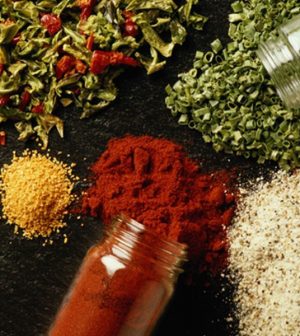- 10 Strategies to Overcome Insomnia
- Could Artificial Sweeteners Be Aging the Brain Faster?
- Techniques for Soothing Your Nervous System
- Does the Water in Your House Smell Funny? Here’s Why
- Can a Daily Dose of Apple Cider Vinegar Actually Aid Weight Loss?
- 6 Health Beverages That Can Actually Spike Your Blood Sugar
- Treatment Options for Social Anxiety Disorder
- Understanding the Connection Between Anxiety and Depression
- How Daily Prunes Can Influence Cholesterol and Inflammation
- When to Take B12 for Better Absorption and Energy
Spice Up Your Meal to Avoid More Salt

Instead of adding salt to their meals, older adults can use spices to give their food more zip and keep their blood pressure under control, new research suggests.
“We were working specifically with a population of older adults to see if we could reduce the amount of salt in a product and then tailor it to their tastes,” explained study leader Carolyn Ross. She is a professor of food sciences at Washington State University in Pullman.
“This is important because the ability to taste and smell is known to weaken with age, and weaker perception of salty flavors may induce people to season their food with excessive salt, which may increase their risk of cardiovascular disease,” Ross said in a university news release.
For the study, 39 healthy people over 60 taste-tested a white sauce formulation commonly found in ready-to-eat Cajun chicken pasta meals. Participants were given versions of the sauce with varying amounts of salt and different spices and seasonings.
The researchers found that using both herbs and chipotle seasoning made it hard for the participants to tell the difference between sauces with low or high levels of salt.
But the addition of herbs alone — such as basil, garlic powder and coarse ground pepper — was less effective at masking the lower-salt samples, the findings showed.
The report was recently published online in the journal Food Quality and Preference.
The findings suggest that spice could play a significant role in reducing older adults’ salt intake.
“To date, a clear relationship between taste loss, and thus higher taste thresholds, and eating behavior remains to be established,” Ross said. “So, we are investigating a bunch of different possible factors.”
When it becomes feasible to recruit volunteers for in-person studies, the researchers plan a large follow-up to see how lower amounts of salt and different herb and spice concentrations affect how older adults perceive the taste of foods.
More information
The American Heart Association outlines how to reduce sodium in your diet.
SOURCE: Washington State University, news release, Feb. 2, 2022
Source: HealthDay
Copyright © 2026 HealthDay. All rights reserved.










